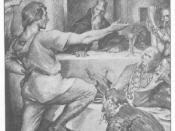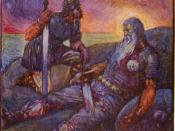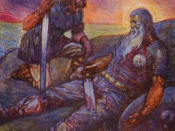Lance Brumfield
28 September 2003
Ms. Hutchens
English IV, 3rd hour
Beowulf the Good
Beowulf encompassed good in Anglo-Saxon culture. He was generous, brave, and intelligent. He fought Grendel, the troll-wife, and a dragon just to name a few. He used his wits against his enemies. He led his people in battle and at home.
Beowulf was an example of generosity to the Anglo-Saxons. He was generous with his time, because he left his home to help Hrothgar. "He heard of the deeds of Grendel and commanded for a boat to see the king" (ll.130-136). Also, before he dies he tells Wiglaf to give the dragon's treasure to his people. "I thank the lord who granted me the grace to gain such a treasure for my people. Head the wants and needs of my people" (ll.1700-1705). Beowulf displays generosity when he shares stories with the other men in Hrothgar's mead hall.
Beowulf was an example of bravery to the Anglo-Saxons. He goes to help Hrothgar because no one can defeat Grendel. The narrator says "No man could move him to stay his hand or pay for his murders" (ll. 117-118). He also fought the troll-wife alone. In Beowulf the narrator says, "As he planned his plunge to the depths of the pool" (l. 961). He is plunging into the pool by himself. This shows that Beowulf does not need others to give him courage. He also leads his men-who leave him-into battle against the dragon. He was forced to fight the dragon alone until Wiglaf came to his aid. The narrator says "Under the stone-cliff: he trusted the strength of his single might. Not so does a coward!" (ll. 1510-1511). This says he trusted his strength, which gave him courage.
Beowulf is an example of intelligence to the Anglo-Saxons.


